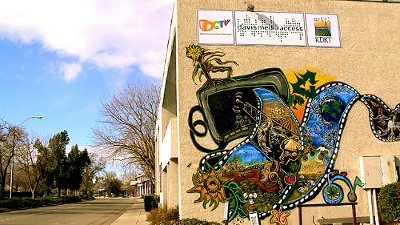KDRT-LP: Davis's Radio Mavens
 What do your pre-teens listen to at 5:30 PM on Tuesdays? If you're in Davis California, probably Rocket Radio, an interview and talk show aimed at elementary schoolchildren. It's hosted by a plucky pre-teen named Rocket, who interviews friends and reads stories on the air.
What do your pre-teens listen to at 5:30 PM on Tuesdays? If you're in Davis California, probably Rocket Radio, an interview and talk show aimed at elementary schoolchildren. It's hosted by a plucky pre-teen named Rocket, who interviews friends and reads stories on the air.
KDRT-LP, home of Rocket Radio, broadcasts a cornucopia of programming driven by the station's core values: diversity, localism, social equality, public participation, and media literacy. KDRT-LP has faced many obstacles, but has become a shining example of what a community radio station can be. Jeff Shaw, KDRT's longtime station director, describes the station's format as "purely eclectic." For sure! This seven-year-old LPFM is chock-full of unique programming, including the Davis Garden Show, whose podcast has gained national recognition and questions from all over the country. The hosts give gardening advice to call-ins, as well as advice about the weather and soil conditions in Davis.
Davis Media Access, KDRT's founder, began as a public access TV station, Davis Community Television. The group applied for a license because it wanted Davis to have a radio station in charge of its own destiny, with a local volunteer board directly accountable. The LPFM license afforded Davis Media editorial control and an opportunity to be community-driven. The public access TV station still operates out of the same building as KDRT, and serves to ensure that everyone who has something to say gets to say it.
Located on a main street, people often drop in to see what the beautiful mural on the side of the building is all about. Sometimes those drop-ins turn into some of the fifty to sixty-five KDRT volunteers active at any given time, and Shaw was quick to add "There's definitely room for more people!"
Shaw wants the station to be a place to go. They have video and editing equipment check-outs, and would like to set up a webcam in the future. Just this past year, the station got rid of all of its desks to make more room for folks to hang out. KDRT is a friendly place to be, and is big on outreach as well. At the Davis Farmer's Market, KDRT people table and record segments every other week, and in the past they've broadcast live, and hope to do so in the future.
The station got involved with another local venue when it threw a benefit concert at the Odd Fellows Hall in January 2008. Before then, the hall had fallen into disuse, but after the success of KDRT's concert, the organization owning the hall saw the advantage of having shows there. Now the Hall hosts them regularly! The station broadcasts some live, and sometimes records them for Live Tracks, currently featured on the front page of its website (http://kdrt.org/).
KDRT livens up local events, too: around the time it first went on air, there was a large parade going on in downtown Davis. The band that was supposed to show up...didn't. Luckily, Shaw and KDRT were ready and willing to help! The parade organizers gave the station a CD to play, and all the cars in the parade tuned in and maxed out their speakers. The parade was a great success.
The station has been very successful in the last few years, but KDRT has had to fight to hit paydirt. Despite the Federal Communications Commission's rule change in the middle of the application process in 2000, KDRT's application stayed in the running -- unlike many others'. Next was a hold-up because staffers did not understand the group's current gig, public access TV. After much FCC foofaraw, KDRT got its construction permit in March 2003, and went on air in September 2004. In 2007, after just a few years of broadcasting, Prometheus informed Shaw that a commercial station was moving to Sacramento and planned to use KDRT's frequency. After almost two years of harrowing court battles, the FCC moved KDRT to another frequency. However, the station has clearly flourished in spite of its setbacks.
Shaw wants to remind readers who want to start their own stations that it's all about outreach and service to the group you'll be broadcasting to. "You should like the place you live and be committed to improving your community and the people living there," he says. A station has to have "institutionalized ways to bring in new ideas to keep things fresh...because people aren't just gonna come to you." Shaw says he's realized "you can never be outside at events or meeting with people enough, there is never a plateau, and this has to become part of the vision for a radio station. The broadcast studio itself is simply the last step in the process of engagement with the community."
Thanks to Lucy Saunders-Pappentick for putting together this profile.
